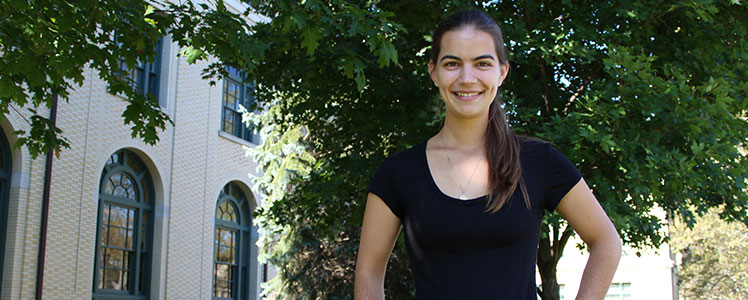How an Aspiring Med Student Is Using Her English Degree

This past April, the Association of American Medical Colleges launched a version of the Medical College Admission Test (MCAT) that now includes a behavioral sciences section designed to measure an applicant’s critical thinking and problem solving skills.
It’s a step that recognizes the importance of the humanities in practicing medicine.
As Carnegie Mellon University alumna Berryhill McCarty (DC’14) goes through the lengthy process of applying to some of the best medical schools in the country, including Columbia, Duke and Harvard, she feels confident that her bachelor of arts degree in English will be valuable to her career in medicine.
“I think studying English promotes skills that enable emotional and intellectual engagement with patients,” said McCarty, who also majored in biological sciences with a neuroscience track. “As a reader, you develop empathy. You also learn how to communicate more effectively.”
She said she believes Carnegie Mellon’s encouragement for an interdisciplinary education – combining the sciences and humanities in the classroom – will ultimately make her a better physician.
“CMU’s English major is responsible for teaching me how to communicate in my science writing,” said McCarty. “The courses taught me to be open to multiple interpretations, to pay attention to detail, and to make unique connections. This critical thinking can be applied to analyzing biological processes.”
One of these courses was "Shakespeare: Tragedies and Histories” taught by associate professor of English Chris Warren.
“Berryhill was a brilliant contributor to our class,” said Warren. “I remember her wonderful performance in the pub scene from Henry IV Part I. Who wouldn’t want a doctor who can read deeply, interpret compassionately, and communicate effectively? There’s a reason med schools love English majors like Berryhill.”
McCarty said that studying literature forces you to put yourself in other’s shoes and analyze experiences from these different viewpoints and that it helped her understand the human side of medicine.
“I believe it is essential that hospital administrators understand how physicians are thinking about disease and interacting with their patients when they are making policy and managerial decisions,” she said.
McCarty is interested in examining literature that works to make science more accessible to a broader audience, such as Rebecca Skloot’s "The Immortal Life of Henrietta Lacks," Siddhartha Mukherjee’s "The Emperor of all Maladies," and Atul Gawande’s work.
At CMU, McCarty had the opportunity to blend humanities and science education in her research.
In 2013, McCarty presented her research paper “International Medical Graduates: The Balance Between Professional and Personal Identity” at the Dietrich Undergraduate Colloquium, an annual event that gives Dietrich College undergraduate students the opportunity to showcase their research. It was her final research paper for the core English course, “Research in English.”
“Much of my research focused on the strategies used by international medical graduates who must overcome various cultural barriers if they want to practice in the United States, and analyzed how these barriers shape the professional identities of foreign born physicians,” said McCarty.
McCarty went on to earn her master of science from CMU’s Health Care Policy and Management program. In her graduate work, she examined how rhetoric is used to promote health policy and its impact on patient health, particularly with how the media presented the Ebola epidemic and the outcomes.
During her graduate studies, she was also involved in the Health Professions Program, which helps prepare students and alumni for a career in the health professions. In October, McCarty will travel to Nepal to volunteer on a medical mission trip while she waits to hear back from medical schools.
McCarty’s advice for any CMU undergraduate student primarily interested in science is to explore the classes that the Department of English has to offer.
“There are so many wonderful ones and they can improve your learning across a variety of disciplines,” she said.
Students unable to add an additional major or minor, should check out CMU’s Global Communication Center (GCC). The GCC is a good resource for learning how to communicate the sciences. It offers free communication instruction and support to students—and faculty— through workshops, one-on-one tutoring and classroom support.
Story Update: Since we last spoke with McCarty in September, she has interviewed at 12 universities including Columbia, Duke and the University of Pennsylvania. McCarty said almost all her interviewers commented on her CMU English background and on the importance of writing and communication in medicine. As of January 2016, McCarty has officially been accepted at Vanderbilt, the University of Virginia, the University of Michigan and the Icahn School of Medicine at Mount Sinai.
___
By Amanda King